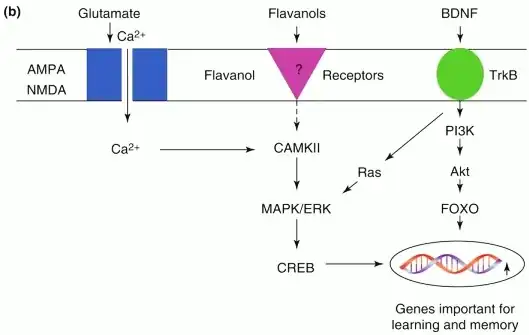From Exercise and the brain: something to chew on:
Evidence is accumulating that exercise has profound benefits for brain
function.
Physical activity improves learning and memory in humans and
animals. Moreover, an active lifestyle might prevent or delay loss of cognitive function with aging or neurodegenerative disease.

Nutrition and exercise affect neuronal signaling pathways important for synaptic plasticity and cognitive function.
BDNF and glutamate act at receptors that regulate calcium/calmodulin-dependent protein kinase II (CaMKII) and mitogen-activated protein kinase (MAPK)/extracellular signal-regulated kinase (ERK) systems.
Flavanols might activate similar signaling pathways, raising the possibility that natural compounds have a selective neuronal receptor (? indicates a hypothetical receptor ).
BDNF also influences the phosphatidylinositol 3-kinase (PI3K)/Akt and the FOXO subfamily of forkhead transcription factors, elevating expression of genes important for learning and memory.
From Exercise is Brain Food [Abstract only ]:
In animal models, physical activity enhances memory and learning,
promotes neurogenesis and protects the nervous system from injury and
neurodegenerative disease.
Neurotrophins, endogenous proteins that
support brain plasticity likely mediate the beneficial effects of
exercise on the brain.
In clinical studies, exercise increases brain
volume in areas implicated in executive processing, improves cognition
in children with cerebral palsy and enhances phonemic skill in school
children with reading difficulty.
In 2009 CBC News did a piece (19 min video )
about City Park High School in Saskatoon (this is an alternative school for those with learning difficulties ), that put treadmills and
exercise bikes into a math classroom.
Well, the cardio equipment went in the classroom in February, and by
June, pretty much all the kids had jumped a full grade in reading,
writing and math.
Exercise causes the brain to create more nerve cells (neurogenesis), makes those nerves stronger, and helps them withstand stress, and improves neurotransmitter function, which helps the brain work better.
Dr. John Ratey, one of the key researchers in this area, noted not only improvements in those with ADHD, but also in those with bipolar disorder and schitzophrenia as well.
[via Trusted.MD]
More:
